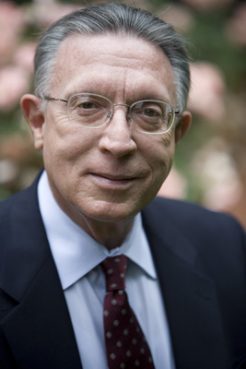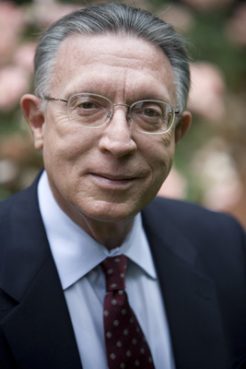
(RNS2-JUNE04) The Rev. Stan Hastey is retiring as head of the liberal Alliance of Baptists after 20 years. For use with RNS-HASTEY-PROFILE, transmitted June 4, 2009. Religion News Service photo by David Jolkovski.

(RNS2-JUNE04) The Rev. Stan Hastey is retiring as head of the liberal Alliance of Baptists after 20 years. For use with RNS-HASTEY-PROFILE, transmitted June 4, 2009. Religion News Service photo by David Jolkovski.
WASHINGTON — The Rev. Stan Hastey spent the past two decades leading a small band of progressive Baptist activists in one direction while their more conservative Southern Baptist brethren moved the other way.
But the movement that has grown to include a variety of issues — from advocating religious freedom for fellow Cuban Baptists to reaching out to non-Christians — remains small, in part because of two issues: female ministers and full inclusion of gays in the church.
“Our small size has everything to do precisely with those two matters,” said Hastey, 64, in an interview.
Hastey, who grew up in Mexico with missionary parents, is packing boxes and files ahead of his July 1 retirement date as leader of the Alliance of Baptists. From his office at the First Baptist Church of Washington, which has housed the alliance for most of its life, Hastey proudly says he’s learned one thing: bigger isn’t always better.
“Let me say as clearly as I can,” he told the group’s convention in April, “that I’d far rather the Alliance be small and inclusive than large and exclusive.”
The Alliance began in 1987 with 33 founding members and grew to about 3,000 members at its height in 1990. It now has 1,000 individual members and 126 member churches, with a combined membership of about 75,000.
In comparison, the moderate Cooperative Baptist Fellowship (CBF), which began in 1991 and opted not to merge with the Alliance, has more than 1,800 contributing churches with a total membership of about 700,000.
Clarissa Strickland, who works with the Atlanta-based CBF, said Hastey is respected among Baptists for his integrity, and for leading a small group of left-leaning activists in a denomination that was often less than receptive to their agenda.
“When he came to the Alliance, he took a huge risk `cause nobody knew if that little infant was going to make it out of the neonatal unit,” she recalled. “They have stayed small but they are prophetic and they are not afraid to be on the cutting edge.”
Nonetheless, the Alliance remains dwarfed by the much larger 16-million-member Southern Baptist Convention. Richard Land, president of the Southern Baptists’ Ethics & Religious Liberty Commission, will quickly tell you why.
“The reason they stayed small is they got very few fish to fish for,” Land said. “In the very large Southern Baptist pond, there weren’t very many liberal fish.”
While Hastey acknowledges that his group is now probably a mere “footnote” in Southern Baptist history, he said his organization has moved on to affiliate and work with people from a range of faith backgrounds. It became a member body of the National Council of Churches in 2000, and recently helped lead a dialogue with Muslim scholars.
“Those of us in the Alliance who came out of (the Southern Baptist) Convention had a grief process to go through, because essentially it was like losing mother church, but what we found out in the process of that grieving was that we could still be Baptist,” said Hastey, who once worked as a journalist with the SBC. “We could … find our own identity not only as an admittedly small association of Baptists but find our way … in the larger church, in the ecumenical world.”
Yet if Southern Baptists found the group’s stances on gay marriage and women ministers anathema, others found it attractive.
“Most of the new congregations that have come into the Alliance over the last 10 years in fact have been American Baptist churches,” Hastey said of the churches, whose denomination, like others, has been torn over the issue of homosexuality.
The Rev. Steve Sprinkle, who serves on the Alliance board and is a leader of the Association of Welcoming & Affirming Baptists, recalled how Hastey voiced his commitment to gays and lesbians — including moving the Alliance’s 2005 convention after the host church objected to a lesbian minister on the program.
“He said, `We are with you all the day long and all the way through,”‘ said Sprinkle, a theology professor at Brite Divinity School in Fort Worth, Texas. “I have seen the Alliance remain true to that.”
(BEGIN FIRST OPTIONAL TRIM)
Jeanette Holt, who served as associate director of the Alliance until her retirement in 2007, said Hastey was the “guiding force” in the group’s efforts to support women ministers with monthly financial supplements for seminary tuition or pastoral salaries.
“Nearly 35 percent of our churches had women as either senior pastor or co-pastor, which gives us, with our small numbers, a better track record than almost any other Protestant denomination,” she said.
(END FIRST OPTIONAL TRIM)
Beyond the hot-button issues of women’s and gay ordination, Hastey has also ventured into the international scene, most notably working with Baptists in Cuba.
“The results were relationships between congregations that transcended political divisions, and overcame the ravages of a continuing blockade that did nothing but hurt innocent people,” said Baptist minister C. Welton Gaddy, president of Interfaith Alliance, and a founder and longtime board member of Hastey’s organization.
Colleagues note that Hastey has been respected for his preaching and his humility as he stood his ground on progressive issues.
“He is committed to this activism,” said the Rev. James Dunn, the former head of the Baptist Joint Committee for Religious Liberty, and a professor at Wake Forest University School of Divinity.
Hastey hopes the alliance will become even more inclusive after he retires. Already, it has some members who are not only former Southern Baptists, but also former Baptists, including members of Presbyterian and Episcopal churches.
“As far as individual members go,” he said, “we don’t require that they remain Baptists forever.”




